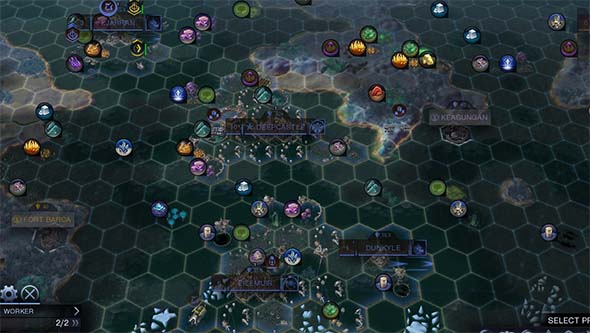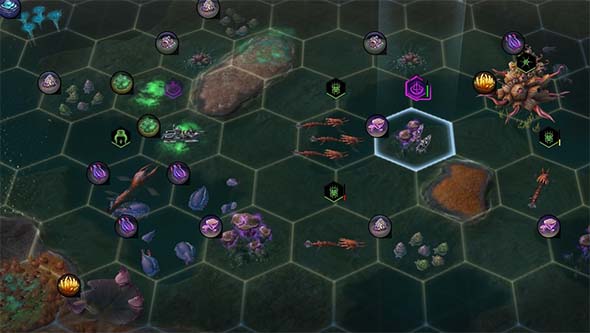
I'm starting to feel like quite the prognosticator. Earlier this year, I started tossing around the idea of Nomadic civilizations for future Civ games. Around the same time, Creative Assembly announced Attila: Total War. They had apparently come up with almost the same idea independently at the same time. Well, now the teams at Firaxis have also implemented a variation of my idea for their new expansion to Beyond Earth, called Rising Tide.
This expansion seeks to remedy several of the core complaints with the Beyond Earth game. In my original review for Beyond Earth, my two biggest complaints were that the game and its leaders lacked the personality and variety of Civilization V, and that it just didn't feel futuristic enough. Both of these complaints ended up being the major focus of the first expansion, which definitely helps to make Beyond Earth stand out a little bit from its more realistic counterpart.
So we sailed up to the sun, till we found a sea of green
One of Beyond Earth's biggest failings was its lack of creativity in using its futuristic setting to innovate gameplay. The game felt very much like a reskin of Civ V rather than a new game. A big part of this was that the map posed many of the same sorts of restrictions on players that the Civ V map did: mountains, canyons, and oceans were all obstacles either impassable by units or uncolonizable by cities.

Aquatic cities and civilizations help to separate Beyond Earth's futuristic setting from Civilization's historical roots.
Well now one of those restrictions has been lifted, and civilizations can build floating cities in the oceans. Such cities can even be moved in order to claim new tiles or to act as mobile military bases. This opens up some interesting (and sometimes silly) new strategic possibilities, but the whole mechanic feels a bit contrived to me. Moveable cities is something that I think can work very well in Civilization, but I just don't feel that Firaxis gave us much reason to ever need to move cities in this game. My proposal for nomadic civilizations was two fold: such a faction could mobilize its entire civilization right up to an enemy's borders during war; and it could also move in response to changing map conditions (migrating animal resources or climate change) during peace. Beyond Earth hits that first point by turning cities into massive aircraft carriers, but there aren't any mechanics in place to make the map a factor.
Fish and other harvestable sea creatures don't migrate, and other resources don't move. So if you aren't using your aquatic cities as mobile military bases, then there's never any real need to move them. And if you're not playing as the North Sea Alliance faction, then the cost to move a city can feel prohibitively expensive. The people at Firaxis seemed to have recognized this, and so they made it so that aquatic cities don't grow their borders based on culture. Instead, you must either buy new tiles or move the city itself in order to acquire adjacent tiles. But since moving takes valuable production time away from the city, I rarely find myself moving a city, and instead I just buy any tiles that I want.
Aquatic cities can be moved, and can act as mobile military platforms and aircraft carriers.
There are other pros and cons to aquatic cities, such as health benefits, faster virtue acquisition, and more profitable trade routes. You can also move the cities around to temporarily acquire resources that allow you to build specific resource buildings, but at the cost of possibly temporarily hurting your city's growth or production (and maybe even starving the city if you move away from food-generating tiles). So there's a lot to think about when build an aquatic or nomadic civilization, but it all feels kind of like ad hoc mechanics in order to make the mechanic seem more meaningful than it actually is. That isn't to say that mobile cities is a bad feature in Beyond Earth. It's perfectly functional, and can be fun to play around with. It just feels a little gimmicky.
Just look at the world around you, right here on the ocean floor
It certainly helps that the oceans themselves are a much bigger part of the game. The ocean isn't just divided into coastal tiles and empty ocean anymore. There's a whole host of new aquatic resources, and even the sea floor itself has different features. This definitely provides some incentive and reward to building floating cities, since the ocean can be a rich source of resources. The ocean tiles themselves can even be improved with a variety of new improvements (including basic farms and mines).

The oceans are alive with life and resources, giving reason to found aquatic cities.
Aliens are also active in the oceans. Sea creatures will build nests (just like their land counterparts), and there's a new alien creature called Hydrocoral that is stationary but which spreads across the ocean surface if left unchecked. Resource pods, artifacts, and quest triggers can all also be found in the ocean. So there's plenty to do in the water now, oceans feel more like a genuine part of the map rather than just dead space between continents, and the variety of features and resources in the ocean helps to make the world look more alien.
...
[More]